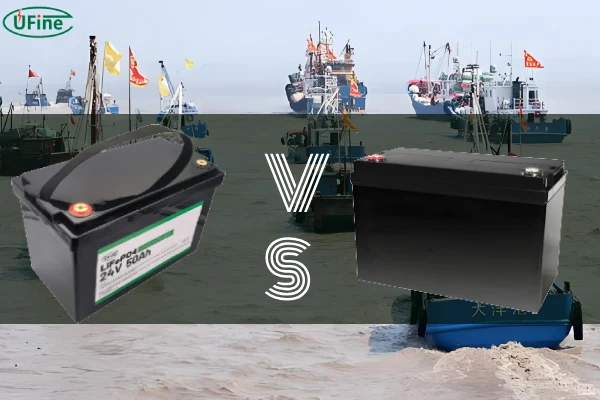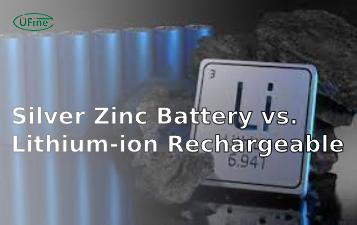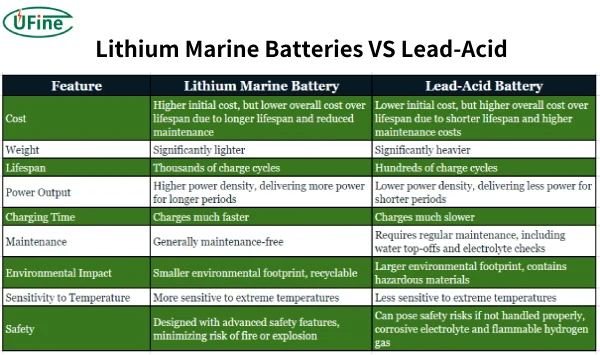
The heart of any boat is its battery system. It powers everything from navigation and communication systems to trolling motors, lights, and even onboard amenities like refrigerators and entertainment systems. Choosing the right battery is crucial for ensuring reliable performance and a smooth sailing experience. While lead-acid batteries have long been the standard choice for marine applications, lithium marine batteries are gaining popularity due to their impressive advantages. This guide will delve into the intricacies of both types of batteries, comparing their strengths and weaknesses to help you make an informed decision for your boating needs.

Part 1. Lithium marine batteries: the future of marine power
Lithium marine batteries are the newest generation of marine batteries, utilizing lithium-ion technology that has revolutionized portable electronics and electric vehicles. These batteries offer a significant leap forward in terms of performance, efficiency, and longevity compared to traditional lead-acid batteries.
Advantages of Lithium Marine Batteries:
- Exceptional Power Density: Lithium marine batteries boast a much higher energy density than lead-acid batteries. This means they can store more energy in a smaller, lighter package. This translates to increased power output and extended run times for your boat’s electrical systems.
- Lightweight Design: The lighter weight of lithium marine batteries is a significant advantage for boaters. It reduces stress on the boat’s hull, improves overall performance, and can even lead to fuel savings.
- Extended Lifespan: Lithium marine batteries are renowned for their long lifespans. They can withstand thousands of charge cycles without significant degradation in performance, unlike lead-acid batteries that typically require replacement after a few hundred cycles. This translates to significant cost savings over the long term.
- Rapid Charging: Lithium marine batteries charge significantly faster than lead-acid batteries. This is a major benefit for boaters who need to recharge quickly, especially in situations where time is limited.
- Maintenance-Free Operation: Lithium marine batteries are generally maintenance-free. They don’t require regular water top-offs or electrolyte checks like lead-acid batteries, simplifying battery management and reducing the risk of spills or corrosion.
- Improved Safety: Lithium marine batteries are designed with advanced safety features, including built-in protection against overcharging, over-discharging, and short circuits. This minimizes the risk of fire or explosion, making them a safer option for marine applications.
- Environmentally Friendly: Lithium marine batteries have a smaller environmental footprint than lead-acid batteries. They contain fewer hazardous materials and are recyclable, contributing to a more sustainable boating experience.
Disadvantages of Lithium Marine Batteries:
- Higher Initial Cost: The biggest drawback of lithium marine batteries is their higher initial cost compared to lead-acid batteries. However, their longer lifespan and reduced maintenance costs can offset this difference over time.
- Sensitivity to Temperature Extremes: Lithium marine batteries are more sensitive to extreme temperatures than lead-acid batteries. While they can operate in a wider temperature range, prolonged exposure to very hot or very cold conditions can affect their performance and lifespan.
Part 2. Lead-acid batteries: the traditional choice
Lead-acid batteries have been the mainstay of marine power for decades. They are still a popular choice for boaters due to their affordability and widespread availability.
Advantages of Lead-Acid Batteries:
- Lower Cost: Lead-acid batteries are significantly cheaper than lithium marine batteries, making them an attractive option for budget-conscious boaters.
- Wide Availability: Lead-acid batteries are readily available at most marine supply stores and auto parts retailers, making them easy to find and replace.
Disadvantages of Lead-Acid Batteries:
- Heavy Weight: Lead-acid batteries are significantly heavier than lithium marine batteries, which can be a major drawback for smaller boats or boats with limited weight capacity.
- Shorter Lifespan: Lead-acid batteries have a shorter lifespan than lithium marine batteries, requiring more frequent replacements and associated costs.
- Maintenance Requirements: Lead-acid batteries require regular maintenance, including checking the electrolyte levels and adding distilled water as needed. This can be time-consuming and inconvenient.
- Slow Charging: Lead-acid batteries charge much slower than lithium marine batteries, which can be a major inconvenience for boaters who need to recharge quickly.
- Lower Power Output: Lead-acid batteries have a lower power density than lithium marine batteries, meaning they can’t deliver as much power for extended periods.
- Safety Concerns: Lead-acid batteries can pose safety risks if not handled properly. They contain corrosive electrolyte that can cause burns if spilled, and they can release flammable hydrogen gas during charging.
Part 3. Buying marine batteries: key considerations
When choosing between lithium marine batteries and lead-acid batteries, it’s crucial to consider several key factors:
- Capacity (Amp-Hours): The capacity of a battery is measured in amp-hours (Ah), indicating how much energy it can store. Determine your boat’s total power needs by listing all equipment and devices powered by the battery, including navigation systems, fish finders, lights, pumps, trolling motors, and onboard appliances. Calculate the total energy consumption to determine the battery capacity you need.
- Voltage: Marine batteries typically operate at 12 volts. Ensure the battery you choose is compatible with your boat’s electrical system.
- Size and Weight: Consider the available space in your boat and the weight limits of your vessel. Larger batteries provide more capacity but take up more space and add more weight.
- Depth of Discharge (DoD): The DoD refers to the percentage of a battery’s capacity that can be safely discharged before needing a recharge. Deep discharge batteries typically have a higher DoD than standard batteries. Choose a battery with a DoD that aligns with your intended usage patterns.
- Charging and Maintenance: Different battery types require different charging methods and maintenance routines. Research the specific requirements of the battery you are considering to ensure proper care and longevity.
- Budget: Marine batteries range in price depending on their type, capacity, and features. Balance your budget with your performance requirements and long-term value. Consider the initial cost of the battery, its expected lifespan, and the cost of ongoing maintenance when making your decision.
- Lifespan: Consider the expected lifespan of the battery when making your decision. Lithium marine batteries offer a significantly longer lifespan than lead-acid batteries, potentially saving you money in the long run.
- Environmental Impact: Lithium marine batteries have a smaller environmental impact than lead-acid batteries. They contain fewer hazardous materials and are recyclable, contributing to a more sustainable boating experience.
Part 4. Lithium marine batteries vs. lead-acid batteries
When to Choose Lithium Marine Batteries:
- For boaters who prioritize performance and efficiency: Lithium marine batteries offer superior power output, extended run times, and faster charging, enhancing your boating experience.
- For boaters with limited weight capacity: The lighter weight of lithium marine batteries is a significant advantage for smaller boats or boats with limited weight capacity.
- For boaters who value longevity and reduced maintenance: Lithium marine batteries have a much longer lifespan and are generally maintenance-free, saving you time, money, and hassle in the long run.
- For environmentally conscious boaters: Lithium marine batteries have a smaller environmental footprint than lead-acid batteries, contributing to a more sustainable boating experience.
When to Choose Lead-Acid Batteries:
- For boaters on a tight budget: Lead-acid batteries are the most affordable option, making them a good choice for budget-conscious boaters.
- For boaters who prefer simplicity and familiarity: Lead-acid batteries are a traditional choice, and many boaters are familiar with their operation and maintenance.
Related Tags:
More Articles

What is the Difference Between Silver Zinc Battery vs. Lithium-ion Rechargeable?
Compare silver zinc and lithium-ion rechargeable batteries: energy density, cycle life, safety, cost, and uses in drones, medical devices, EVs, and electronics.
What are Watts and Watt Hours in Battery?
Understand watt vs watt-hour in batteries: key differences, how to calculate capacity, and why they matter. Includes free comparison table.
Best 10 Blood Pressure Monitor Battery Review: Finding the Most Reliable
Are you looking for a reliable Blood Pressure Monitor battery? Here is a complete guide with the top 10 best blood pressure monitor batteries.
Bluetooth Headphone Battery Guide: All You Need to Know
Maximize headphone battery life with expert tips! Learn how to charge, check, troubleshoot, and choose the best bluetooth headphone battery in 2025.
LiFePO4 Battery VS. Lithium-ion Polymer Battery: Which One Is Best?
Comprehensive comparison of LiFePO4 vs Lithium Ion Polymer batteries: energy density, safety, lifespan, cost. Find out which battery suits your needs in 2025.



